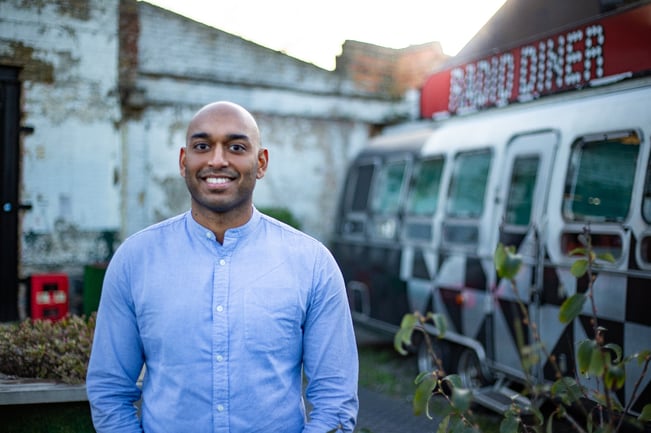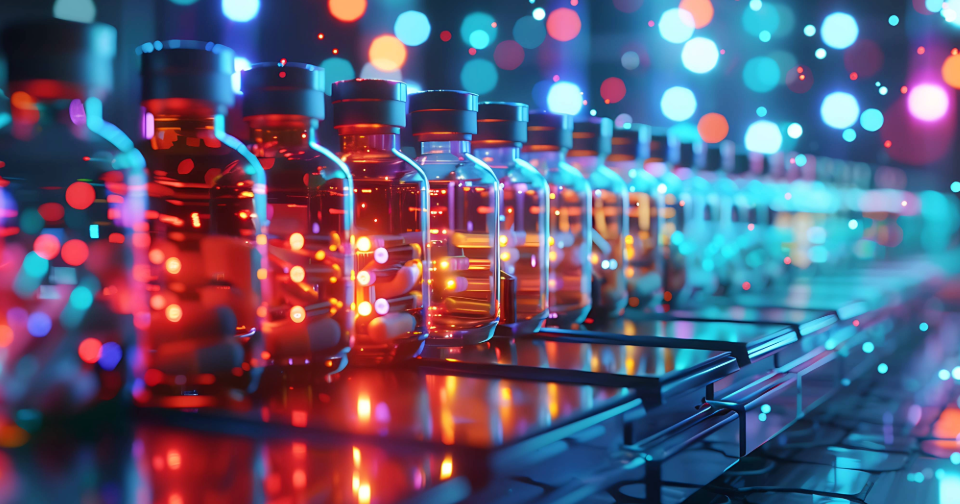How Better Dairy are creating products that are molecularly identical to traditional dairy (without cows!) and the benefits of doing so.
Forward: features are independent pieces written for Mewburn Ellis discussing and celebrating the best of innovation and exploration from the scientific and entrepreneurial worlds.
FoodTech is red hot right now: Tel Aviv based SuperMeat is developing lab-grown chicken meat from cultured cells; there's Finless Food in California for lab-grown fish, starting with tuna; and the top name in the milk industry is Jevan Nagarajah's Better Dairy, based in London's Hackney Wick.
The Better Dairy concept is simple: milk and cheese without cows. Its products are molecularly identical to traditional dairy. By removing the cows from production, it is possible to slash CO2 and methane emissions, free up land, remove hormones and antibiotics from the food chain, and even improve the structure of dairy products. Better Dairy is a fitting name.
So how are milk and cheese produced without cows? 'We follow a process called precision fermentation,' explains Nagarajah, who serves as co-founder and CEO of Better Dairy. 'If you think of something like beer brewing, which uses traditional fermentation, you take yeast, put it into a fermenter, feed it with yeast and sugars, add water, leave it for a couple of days, and the output is beer. We are doing something very similar. We modify the yeast so that rather than producing beer, it produces dairy.'
The key is to modify the yeast. 'We are engineering improvements,' says Nagarajah. 'There are precedents for us to work on. We are taking the work that's been done to make insulin, and are applying our own R&D.'
Better Dairy ferments the yeast in vats to produce pools of milk. The company then uses the milk to make cheese, where the margins are higher (even the most efficient dairy farms struggle to make money selling just milk in today's market).
The method ensures a healthy dose of casein in the end product, known to food-lovers as the protein that releases casomorphins, compounds which trigger dopamine production in the brain. Casein also adds gooiness to the cheese texture. Plant-based cheeses don't contain natural casein, though vegan alternatives are in development.

Jevan Nagarajah, Better Dairy Founder and CEO
Today, Better Dairy creates cheddar and Gouda. The taste? Views vary. A Times newspaper journalist detected a difference between Better Dairy's cheddar and the traditional versions, but added, 'it’s a convincing prototype of something that could be. If I were a dairy farmer, it would give me bad dreams.' A tasting by BBC Radio 4's The Food Programme said, 'the texture is good...compared to vegan cheese, which has been around a long time, this definitely tastes better'.
'When we started, you definitely would be able to taste the difference,' admits Nagarajah. 'When we strip out things like lactose and need to build the recipe again, we need to make sure we're ending up with a good-tasting cheese. Now if you taste the cheddar prototypes, I would say they are indistinguishable from a mild to semi-mature cheddar.' Mozzarella and Gorgonzola are next.
Where Better Dairy excels is the ability to control every aspect of production. Take lactose: 'A swathe of the world are lactose intolerant,' notes Nagarajah. 'We are looking at replacing lactose with a different source of sugar, making lactose intolerance a thing of the past.' As the bioengineers at Better Dairy refine their methods, it will be possible to manipulate every aspect of the dairy output. Longer lasting milk is conceivable.
'We can control maturation and flavour development in a way no one has in the past. Maybe we can develop new flavours and textures to create exciting new products for consumers. Without going too Willy Wonka about it, there are a lot of exciting possibilities.'
Naturally, without the cows, many of the undesirable elements of production are eliminated entirely. 'There are no hormones or antibiotics that are introduced by animal farming. And we are looking at things like fat. We could potentially swap out butterfat for more healthy fats. Once it doesn't affect the end product quality we can end up with a product that tastes as good, but is potentially healthier as well.'
Next mission: get to market
The commercial potential of cowless dairy is equally mouthwatering. The global industry is estimated at $871 billion in revenue a year. In theory, a lab-grown alternative could undercut traditional farming, depending on energy costs and environmental requirements.
The omens are good. Major economies are hitting dairy farms with environmental taxes. In the Netherlands, for example, up to 3,000 farms are set to close as the government seeks to reduce nitrogen oxide omissions to comply with EU targets. Better Dairy offers a cleaner path for the food industry, and a way to avoid emissions penalties.
'There are tremendous savings on CO2 and other emissions,' says Nagarajah. 'I mean, we're talking above 90% reductions in CO2 and greenhouse gases, we're looking at above 90% reductions in land use, and above 90% reduction in water use. Making these kinds of gains is hugely, hugely tangible to net zero targets.'
The fundamental mechanics of the process are proven. Better Dairy now needs to refine the technology and learn to scale. 'What you do in a lab might work on a small scale, but won't hold at a larger scale,' says Nagarajah. 'It's like stirring sugar in a cup of tea – it's a lot easier to stir a block of sugar [into a cup] than into a massive container. You can end up with inconsistencies and all kinds of different issues.'
Growth capital is secured. In January the team obtained $22m in funding, to a total of $26.9m, from six investors including Happiness Capital and Vorwerk Ventures. The money is being used to expand the scientific team and prepare the products for commercial readiness.
These numbers will be trivial if Better Dairy reaches commercial production. A German rival called Formo has a goal of reaching 10% of European market share by 2030.
A critical moment will be when Better Dairy transitions from research centre to commercial enterprise. It is well placed. The company originated with Entrepreneur First, the incubator which encourages talented individuals to found startups, and is backed by the likes of Demis Hassabis of DeepMind and Reid Hoffman, co-founder of LinkedIn. 'Entrepreneur First is a tremendous programme,' says Nagarajah. 'It started in London and is now global. It brings together a lot of proven executors and entrepreneurs. I was surrounded by people who were working on magnetism and nuclear fusion. In my cohort there were also a lot of people with biotech backgrounds.'
Nagarajah is an Imperial College, London alumni and founded a previous FoodTech start-up called ShareDining, backed by Just Eat. 'Entrepreneur First is where we started [Better Dairy] in October 2019. We got our funding from EF, and then had to make it through Covid.'
Nagarajah and his team have been careful to protect their intellectual property from the outset. 'We work with Mewburn Ellis on IP,' says Nagarajah. 'Our strategy is a mix of patents and trade secrets. We are at the intersection of so many different segments – an environmental side, biotech side, and FoodTech side. It's led us down an interesting journey. In the biotech and pharmaceutical space, IP patenting is very prevalent. In the food industry, trade secrets protect by not disclosing and by locking down internally. Coca-Cola, KFC and Heinz are some examples. We've been reconciling the two, and our strategy contains aspects of both.'
The final hurdles
Better Dairy is tantalisingly close to a market launch. The quality of cheese is improving. The potential to disrupt the market is clearer than ever. 'There's a regulatory side to this,' says Nagarajah. 'We can't forget that we are creating something people need to love, but we also have responsibility as a food manufacturer to make things that are safe to consume. Regulations mean our launch market will be the US. Their regulatory environment is more conducive towards innovations like this. That's exemplified by a number of companies in our space that have already launched in the US.'
Things may change. 'We are talking to the UK regulators. There's a potentially interesting post-Brexit opportunity for the UK to reassess some of the bureaucracy behind the process, keeping things that safeguard consumers, while also streamlining.'
The impact could be huge. Dairy farming was revolutionised by the launch of the milking machine, known as the 'Hygienic Glove Milker,' in 1879. Precision fermented milk could have an even greater impact on the industry.
The FoodTech industry is alive with similar pioneers. Nagarajah singles out Upside Foods of California as an inspiration. 'I get a lot of advice from their CEO, Uma Valeti. I think they've done a tremendous job. They've just raised $400m to start building production facilities to make animal-free meat a reality. A reason I admire Upside Foods is I appreciate all the different aspects that need to come together to deliver. On animal-free meat, the complexity is even further along. In some ways that's good, as we don't need as much capital. We can get to market quicker.'
In November, Upside Foods won regulatory approval from the US Food and Drug Administration to sell chicken made from animal cells grown in bioreactors. So when are we going to be munching on Better Dairy cheddar, Gouda, and the full repertoire of cheese products?
'We are at least two years away from launching in the UK. If we can find a way to streamline that process, we could be looking at 18 months.'
The mission is to create cheese that lasts longer, tastes better, transforms the environmental impact, and is more readily-digestible than anything available today. The losers? Dairy farmers and their cows.
The farming industry needs to reflect on the issue fast. Cheese without cows is almost here, and the entire agricultural sector needs to figure out how to compete with pioneers like Jevan Nagarajah.
|
Taking dairy to the future
Chris Denison, Partner and Patent Attorney at Mewburn Ellis comments:
"We are delighted to be working with Jevan and the team at Better Dairy. As well as their strong understanding of the role IP plays in their journey, the combination of their enthusiasm and engagement, the interesting technology and the huge potential for environmental, health and animal welfare benefits makes Better Dairy a tremendously exciting client to work with. And to top it all, they even appeared on my favourite radio programme!"
Written by Charles Orton-Jones
Chris is a Partner and Patent Attorney at Mewburn Ellis. He is proficient in prosecution, opposition and appeal work at the European Patent Office. Chris also provides associated litigation support in the biotech field, especially biopharmaceuticals, from early stage research through to lifecycle management of approved blockbuster products. He has particular experience of large portfolio management, including diverse portfolios arising from large research programmes and those centred about particular products.
Email: chris.denison@mewburn.com

-Dec-29-2025-09-11-25-2361-AM.png)
